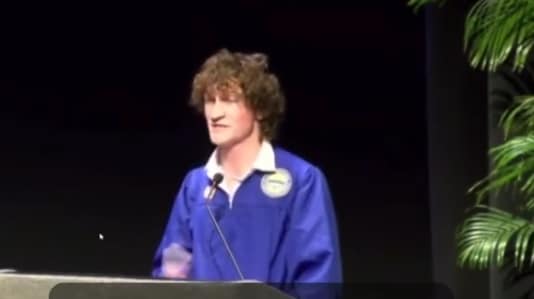
So on Sunday, Moricz gave the speech without saying the word — but still managed to speak directly about who he is and why he advocates for the LGBTQ community. He used his curly hair as a metaphor.
“I used to hate my curls,” he said, after removing his graduation cap and running his hands through his hair.
“I spent morning and night embarrassed of them trying to straighten this part of who I am, but the daily damage of trying to fix myself became too much to endure,” he said. “So while having curly hair in Florida is difficulty due to the humidity, I decided to be proud of who I was and started coming to school as my authentic self.”
Pine View Principal Steve Covert did not respond to The Washington Post’s efforts to contact him. Kelsey Whealy, a spokeswoman for Sarasota County Schools, said in a May 10 email that Pine View’s principal “did meet with Zander Moricz to remind him of the ceremony expectations” but did not say he had been told not to say “gay.”
The Parental Rights in Education bill — which critics have labeled the “don’t say gay” bill — was signed March 28 by Florida Gov. Ron DeSantis (R). The law prevents teachers in kindergarten through third grade from discussing gender and sexual orientation in class and restricts what teachers can say in upper grades to what is developmentally appropriate, without saying what that is. The law goes into effect July 1.
The plaintiffs in the lawsuit allege that the law harms LGBTQ students and families and violates their First Amendment right to freedom of speech, as well as their constitutional right to equal protection under the law.
You can watch Moricz’s speech here:
florida high school class president zander moricz was told by his school that they would cut his microphone if he said “gay” in his grad speech, so he replaced gay with “having curly hair.” i am in awe pic.twitter.com/OqLbar5bwq
— matt (@mattxiv) May 24, 2022
And from Moricz himself:
2 weeks ago, I told you that my graduation speech was being censored and that I needed your help. 48 hours later, 10,000 Say Gay stickers were claimed across Florida. Today, I give the speech. #AdvocateGraduate pic.twitter.com/iSVgADxEPX
— zander moricz (@zandermoricz) May 22, 2022








